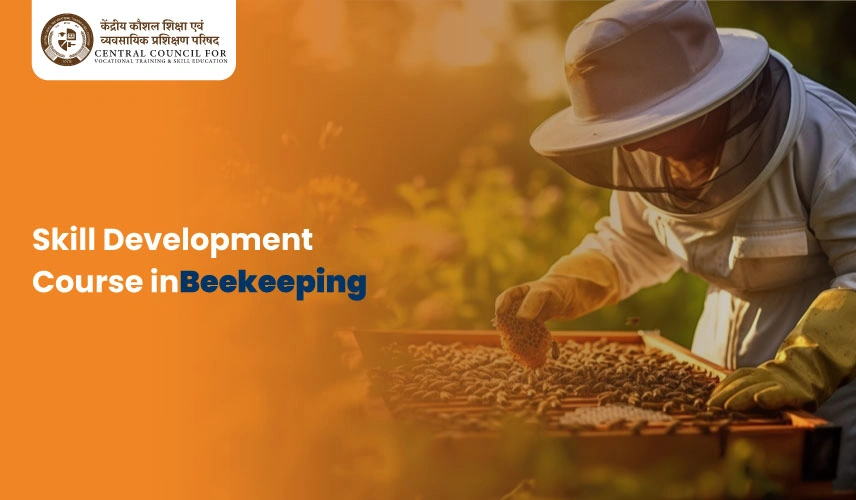- +91 8595350621
- info@ccvte.org
- C4/97B, Keshav Puram, Delhi-110035
Beekeeping

Skill Development Program in Beekeeping
Beekeeping, also known as apiculture, is the practice of maintaining bee colonies for the production of honey, wax, and other bee products. It plays a crucial role in agriculture by enhancing pollination, which improves crop yields and supports biodiversity. Beekeeping involves the management of hives to ensure the health and productivity of bees. This includes tasks such as monitoring bee behavior, preventing diseases, and managing hive conditions to optimize honey production. Beekeepers use specialized equipment, like smokers and hive tools, to handle the bees and maintain the hives. In addition to honey, beekeeping provides valuable products such as beeswax, propolis, and royal jelly, which have various uses in cosmetics, medicine, and food. The practice also contributes to ecological balance by supporting the pollination of wild plants and crops, making it a vital component of sustainable agriculture. The Beekeeping course offers comprehensive training in hive management, bee biology, and honey production. Designed for aspiring beekeepers, it covers essential topics like disease control, equipment use, and bee behavior. This course provides practical skills and knowledge to maintain healthy bee colonies, enhance honey yield, and support pollination, making it ideal for both hobbyists and future professionals.
Why did you choose the Beekeeping Program from CCVTE?
- A skill development course in Beekeeping is designed for students interested in a career in hive management and honey production.
- The course offers practical skills and knowledge needed for successful beekeeping.
- Upon completion, students can pursue opportunities in commercial beekeeping operations or as independent beekeepers.
- Key highlights include flexibility and affordability, enabling quicker and more cost-effective completion compared to traditional programs.
- The curriculum covers essential topics such as hive management, bee health, and honey production, providing a practical and economical pathway to a rewarding career in beekeeping.
- The Beekeeping course also emphasizes sustainable practices and ecological benefits of pollination.
- Students learn about advanced techniques for maximizing honey yield, preventing common bee diseases, and managing hive productivity throughout the seasons.
- The course includes hands-on training with beekeeping equipment and real-world hive management scenarios. Additionally, students gain insights into marketing honey products and expanding their beekeeping ventures.
Specializations in Beekeeping
- Honey Production
- Pollination Services
- Bee Health Management
- Hive Management Techniques
- Queen Rearing and Breeding
- Beeswax and By-products Production
- Sustainable Beekeeping Practices
- Apicultural Research and Innovation
- Urban and Small-Scale Beekeeping
- Commercial Beekeeping Operations
Career Opportunities
Career opportunities in beekeeping span a range of roles centered around hive management, honey production, and pollination services. Professionals can work as commercial beekeepers, managing large-scale operations to produce honey and beeswax.
Additionally, opportunities exist in queen rearing, apicultural research, and sustainable beekeeping practices. Careers in beekeeping can also involve educational outreach, consulting, and developing innovative solutions for hive management and honey production. This field offers diverse pathways for those passionate about bees and their vital role in ecosystems and agriculture.
- Commercial Beekeeper
- Bee Health Specialist
- Pollination Service Provider
- Queen Rearing Specialist
- Honey Production Manager
- Beeswax and By-products Processor
- Apicultural Researcher
- Sustainable Beekeeping Consultant
- Beekeeping Equipment Supplier
- Educational Outreach Coordinator
Syllabus
|
3 Month |
6 Month |
1 Year |
2 Years |
|
Introduction to Beekeeping |
Introduction to Beekeeping |
Introduction to Beekeeping |
Introduction to Beekeeping |
|
Bee Biology and Behavior |
Bee Biology and Behavior |
Bee Biology and Behavior |
Bee Biology and Behavior |
|
Beekeeping Equipment |
Beekeeping Equipment |
Beekeeping Equipment |
Beekeeping Equipment |
|
Beekeeping Practices |
Hive Management Basics |
Hive Management Basics |
Hive Management Basics |
|
Beekeeping Practices |
Beekeeping Practices |
Beekeeping Practices |
|
|
Practical Hive Management |
Practical Hive Management |
Practical Hive Management |
|
|
Honey Production and Processing |
Honey Production and Processing |
Honey Production and Processing |
|
|
Bee Breeding and Genetics |
Bee Breeding and Genetics |
Bee Breeding and Genetics |
|
|
Beekeeping Techniques |
Beekeeping Techniques |
||
|
Beekeeping in Different Environments |
Beekeeping in Different Environments |
||
|
Practical Beekeeping Skills |
Practical Beekeeping Skills |
||
|
Beekeeping Research and Innovation |
Environmental Impact and Sustainability |
||
|
Beekeeping Regulations and Safety |
|||
|
Beekeeping Research and Innovation |
|||
|
Beekeeping Business Management |
|||
|
Community and Educational Outreach |
Top Hiring Opportunities in Beekeeping
- Beekeeping Companies
- Agricultural Co-operatives
- Research Institutions
- Pollination Service Providers
- Honey Processing Companies
- Environmental Organizations
- University Agriculture Departments
- Specialty Food Producers
- Government Agricultural Agencies
- Sustainable Farming Initiatives
Other Paramedical Courses Provided by CCVTE
Frequently Asked Questions
Expect to cover topics like bee anatomy, hive management, honey harvesting, managing bee health, and understanding beekeeping tools and technology.
No prior experience is usually needed; Our course are designed for beginners.
To apply for the Beekeeping program at CCVTE, visit the institution's website and complete the online application form. Submit required documents such as your high school diploma and transcripts. Pay any application fees and follow instructions for any entrance exams or interviews, if required. Check application deadlines and specific program requirements on the CCVTE admissions page.
After completing a Beekeeping program, career opportunities include roles such as commercial beekeeper, pollination service provider, bee health specialist, and honey producer. Graduates can work with research institutions, in sustainable agriculture, or as consultants. Other options include managing beekeeping equipment supply, honey processing, and working with environmental organizations focused on bee conservation and habitat protection.
CCVTE offers flexible study options for its Beekeeping program, including part-time and online courses. Students can choose from evening classes or modular formats to accommodate their schedules. This flexibility allows individuals to balance work or other commitments while pursuing their studies in beekeeping, making it accessible to a broader range of learners.



